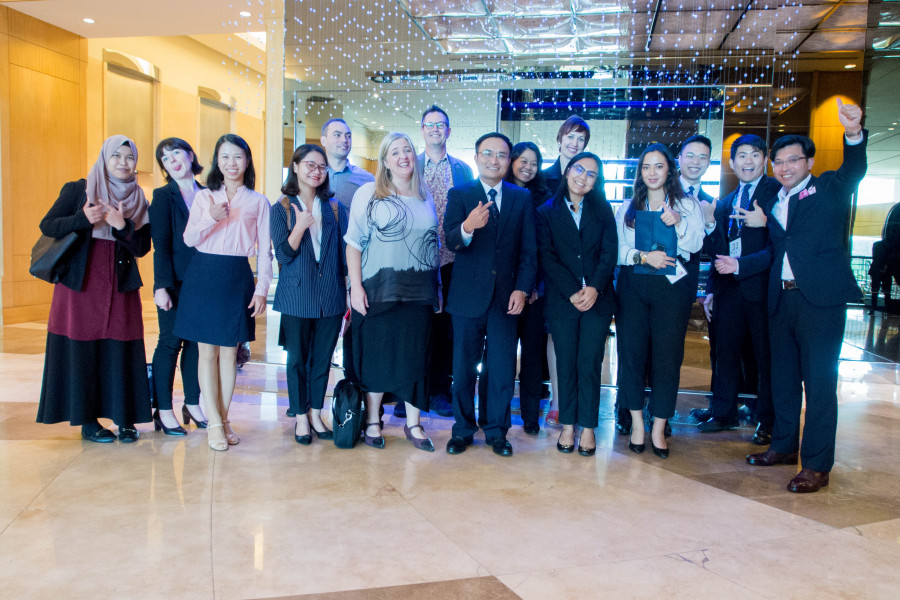Toloa Scholarship opens door to Asia-Pacific opportunity
Toloa Scholarship opens door to Asia-Pacific opportunity

Receiving a Toloa Scholarship has opened up a world of opportunity for William Ti'iti'i Asiata, who recently was part of the New Zealand delegation to attend the 33rd Asia-Pacific Roundtable (33APR).
Of Samoan descent, William was presented with a Ministry for Pacific Peoples Toloa Tertiary Scholarship, to encourage Pacific students to study STEM (Science, Technology, Engineering and Mathematics) subjects at tertiary level.
Since receiving the scholarship last year, William’s main focus has been completing his Master of Information Technology (MIT) studies, at the University of Auckland, he says.
Having finished all his taught papers, he still needs to complete an industry internship to finish the MIT programme.
Along with reducing the debt burden of a postgraduate student loan, the scholarship has led to collateral benefits, which William says will be helpful to his family and community he serves in the long-run.
“Last summer I was fortunate to intern in a text-mining role with Te Hiku Media, working on their Kōrero Māori project to develop Māori speech recognition software,” he says.
“These digital tools will play a significant role in supporting the revitalisation and sustainability of te reo Māori in an era of smart devices and cyber technologies, and the AI Māori language models are suited for adaption to other languages within the Austronesian and especially Polynesian language families using ‘transfer’ machine learning methods.”
Besides the MIT programme, William also chose to study additional Arts papers at university, including a gagana Sāmoa course.
“I was also interested to learn more about Asia and studied subjects about East Asia, China and the Mandarin language - like many Sāmoan families, my āiga also has roots connecting to South China.”
New Zealand population data shows that our country is gradually becoming more Māori, more Pacific, more Asian, and William believes there is huge potential to work on bridging language and cultural barriers within the Asia-Pacific region to support the development of a stable, inclusive, and socially cohesive regional society, united across its diversity.
These trends and needs motivated the pivot in his study direction and he was fortunate to be connected to Asia New Zealand Foundation Te Whītau Tūhono by a professor at university, he says.
“I soon found himself joining the New Zealand delegation to attend the 33APR, hosted by Malaysia Institute for Strategic and International Studies, in Kuala Lumpur, Malaysia as part of the Next Gen #ThinkAsia initiative.”
The initiative aims to bring together a number of young thinkers from around the region to learn about current regional affairs and gain experience in diplomatic activities, and this year's 33APR had a particular focus on the central role of the Association for South-East Asian Nations (ASEAN) in moderating international relationships across the Asia-Pacific region.
"For all the focus on ASEAN centrality with respect to competing geo-strategic notions of Asia-Pacific regionalism such as a Free and Open Indo-Pacific and the maritime component of China's Belt and Road Initiative, there was a lot of attention given to Asia and little actual thought about the Pacific part of the Asia-Pacific during the 33APR,” he says.
However, an interesting point about ASEAN is many ASEAN peoples have Austronesian heritage - that is, like Pacific peoples, we all hark back to common ancestral groupings of pioneering maritime navigators that ventured out from the shores of continental Asia many millennia ago, he adds.
“Based on the historical significance of these ancient relationships, perhaps there is a latent underlying cultural capital that can be leveraged for today's global era to strengthen ties between ASEAN, Aotearoa, and other Pacific nations.”
The 33APR was a great opportunity to be exposed to a number of high-level ideas and keep abreast of the latest issues related to regional security as well as a chance to meet with various academics and diplomats, who play a role in the shaping of policy.
Discussions explored the implications of communication technologies, the impact of the intersecting dynamics of social media platforms and identity politics on recent past and potential future election cycle activity happening across the ASEAN region, William says.
“The overall experience, awareness of the politics of technology, and network connections created will surely inform the direction of my career path in the IT field.”
There is more travel in the pipeline for William who will leave for Vietnam this month, where he will begin an internship withthe Computer Science Department at Thái Nguyên University of Technology, arranged via the International Association for the Exchange of Students for Technical Experience (IAESTE).
"We need more Māori and Pacific students doing international internships in ASEAN,” he says.
